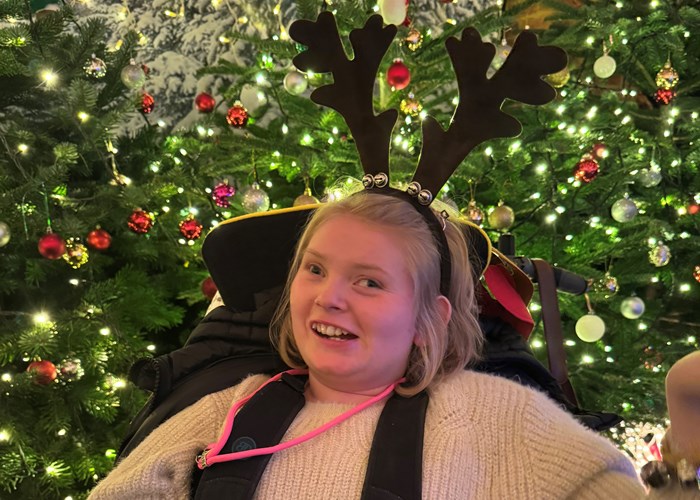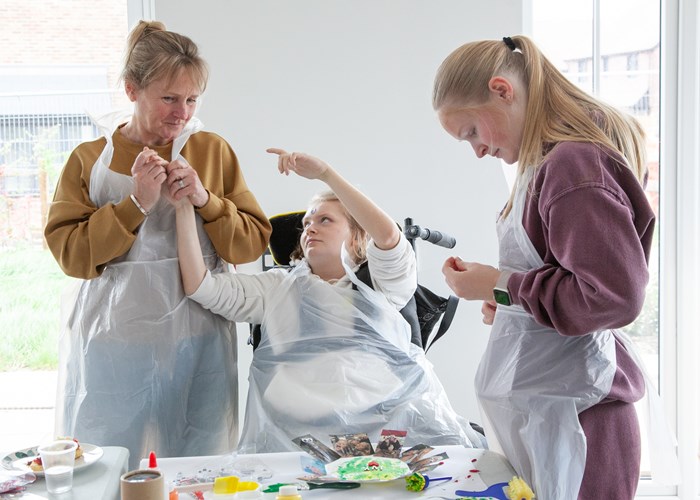“Ivy is 18 now, but she’s still a very complex little girl and requires 24/7 care. She has a condition called mitochondrial cytopathy, which has left her with complex needs, including profound multiple learning difficulties. Ivy is non-verbal and she is 100% reliant on a wheelchair, which supports her. She can generally express herself through excitement, or anger, or she can just laugh her head off, especially when she hears music!"
"We’ve reached out to Demelza for support on and off over the years - Ivy was actually one of the first children to come for respite care when the South East London hospice was opened. When Ivy was 15, she had a major operation to have her spine fused, and I was absolutely terrified - I didn’t think I was going to be able to cope at home, so I reached back out to Demelza, asking for help, and I really regret not doing it sooner. We wasted an awful lot of time, because the services Demelza offers are just incredibly important to us and still are now. Even though she’s 18, we’re accessing services and are supported by Paul and Claire in the transitions team.
When Ivy turned 18, things changed a lot. Everyone dreads it. I was absolutely terrified of how it was going to affect her. Ivy is in and out of hospital a lot, and a children’s hospital is very different to an adult hospital. In a children’s hospital they deal with the family – they see you as a unit, but at the adult hospital they just see Ivy as a patient on her own, which is difficult. They need to realise they I am part of Ivy, I have to communicate for her, to explain her needs – even just moving her is complicated.
During the transition from child to adult services, it’s like nobody knows anything. But I need to talk to somebody who knows what to do! One of the hardest things is that you don’t even know what you’re looking for. So that’s where the transition team are so great, because they’ve done all that reading, they know what to do.
I need Claire and Paul – park to one side that that they are such lovely people, I can ask them anything and even if they don’t know they’ll find out for me. They’ll give me ideas, suggest I try things I hadn’t even thought about! They really know their stuff.
Right now, they’re supporting me with planning for what’s next for Ivy, helping and guiding me in finding a college for her. Claire has really helped with emails to the local authority, she’s been fighting my corner for me! When I write to the local authority about what we need for Ivy, I think they look at me and think it’s just a mum nagging on about their kid, but Claire will back it up. Demelza have a lot of weight and sometimes they’re all it takes to get things moving. Both Claire and Paul came with me to see colleges for Ivy, and that was really nice, because it gives you more confidence and they can ask the right questions while I’m just looking around. It was reassuring having them with me.
Unless you know your stuff, you just don’t get anywhere, and there’s nothing apart from Demelza to help people with this. Once a child reaches 18, everything just sort of falls off a cliff, there’s nothing there. Ivy’s favourite music is counting songs, she loves Disney films – she’s still very much a baby. But just because her birthday says she’s 18, she is now an ‘adult’. It doesn’t make sense.
But times are changing, more and more children with complex needs are living a lot longer with improvements in medicine and care and the gap in support is getting bigger. But I am not going to let that happen to Ivy.
With Demelza there, the support didn’t totally end at 18, it’s carrying on. We attend the transition days that happen every few months – the team feed everybody, provide lots of fun activities, crafting etc, and we all get to swim and use the sensory rooms. It’s a chance for us as parents to all get together, have a laugh, have a moan! And a great chance for Ivy to get together with her mates! Ivy has a friend called Fenton there - we always joke that they are boyfriend and girlfriend, but they really do love each other. When they get in the pool, floating, their little faces just light up. They get to touch, get a different sense of everything, because they’re not in their wheelchairs. Now she’s bigger, I can’t lift Ivy up on to my lap and give her a cuddle, so she misses out on that touch a lot of the time, and the pool gives that back to her.
The transition days are vital for us parents, because it’s how we learn from each other as well. There are people there who have all experienced different things, and it’s interesting hearing from them. I love meeting the other parents - I learn an awful lot from other people, and we have a lot in common. There were a few of us in the pool at the last transition day and we were talking about the births of our children and why our children are the way they are, and we were just really laughing and joking. We’ve gone through this incredibly traumatic experience, because our children aren’t the way that we thought they would be when they were born. It could be heartbreaking, but for us, to all be together, it was actually really nice! We were almost competing with one another, which is what kind of happens normally with birth stories, but we’re on a different level!
For me, the transition team is there on-call and they will drop everything to help. They are a safety net – I know that they have my back. They genuinely care about families and Claire and Paul absolutely love Ivy. They make it their mission to know us and to know our children. I’m really thankful because they have honestly really helped me, and supported me, and given me the weight that I need to get things moving for Ivy and her future.”
- Ruth, mum to Ivy

